All women must be believed – unless they’re on the other side
Are we so far gone that Labor’s Kimberley Kitching bullying problem now is the fault of a Liberal government?
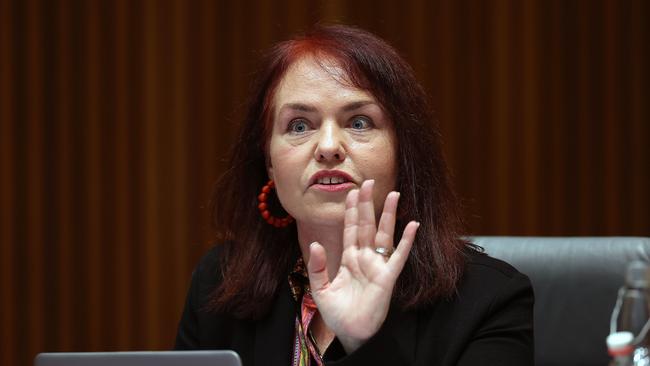
Journalists who verged on the hysterical about allegations involving Christian Porter or Brittany Higgins, sundry other non-specific claims and a so-called toxic culture at Parliament House have flicked the switch to phlegmatic when it comes to Kimberley Kitching. And where were the powerful women – Julia Banks, Georgina Dent, Christine Holgate, Lucy Turnbull, Larissa Behrendt, along with Higgins and Grace Tame – who earlier this month demanded we “have to talk” about how to ensure women are no longer “harassed, unsafe, ignored or disrespected”?
Have I missed their angst and interventions about the treatment of Kitching?
People who, in the Porter episode, were happy to take the withdrawn complaints of a deceased woman, about alleged, denied and exceedingly unlikely events from more than 30 years ago, and reanimate them from beyond the grave, have dismissed the allegedly bullying trauma endured by a dead senator just this month. Was Kitching’s torment just too prosaic to bother the feminist defenders?
The main difference, of course, was the side. The partisan side and the preferred narrative too often trump the principle. Take ABC radio host Virginia Trioli, who wrote about women and the toxic workplace of Parliament House in March last year. She advised Scott Morrison that women needed to be believed. “To listen, really listen,” she wrote on the ABC site. “To understand just how much it took for a woman to speak out at all, and then do the work to establish the truth.”

Yet last week, even before Kitching’s funeral, Trioli seemed more concerned about the term “mean girls” that the late senator had borrowed from a teen movie to describe her female antagonists, Penny Wong, Kristina Keneally and Katy Gallagher, who all deny bullying. “It is profoundly disappointing that it’s playing out in archaic and sexist language that has its origin in representations of witches, harpies and shrews,” Trioli lamented, before noting Kitching was not a “vulnerable ingenue” but had come to politics with a “complicated history”.
So Kitching did not warrant anyone believing her, apparently. She got what she deserved.
So-called independent MP Zali Steggall applauded this assessment from Trioli, who apparently had called out the “ridiculous sexist bs”. Steggall dismissed Kitching’s trauma, saying “that’s party politics” – when she had previously tweeted about the need to “call out” and “stand up” to bullies.
ABC Four Corners executive producer Sally Neighbour retweeted and endorsed Trioli’s apologia for the Kitching affair – “nailed it”. Yet two years ago, promoting her own program’s report, she tweeted in praise of “fantastic young women calling out a toxic boys’ school behaviour”. If only Kitching had been taunted by schoolboys.
In 2018 when some of former prime minister Malcolm Turnbull’s female supporters complained of bullying after the leadership crisis, former Channel 10 reporter Paul Bongiorno tweeted that a party “bullying its women” members made his “skin crawl”. But last week he praised Trioli’s downplaying of Labor bullying, calling it “thoughtful analysis” – I guess his skin crawls only to the right.
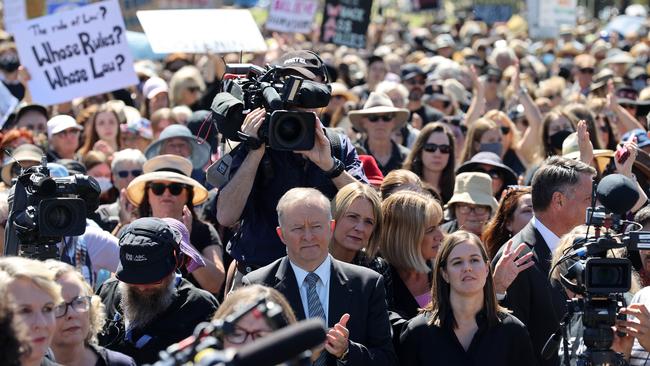
Millionaire leftist television host Lisa Wilkinson said this week that politics was “never pretty” and that the Kitching story was “nuanced and complex”. But a year ago, rallying stridently against bullying in politics, and interviewing Banks, Wilkinson wondered, “What on earth is going on in the Liberal Party?” Then she declared, “Bullies only operate effectively if they’re allowed to live in the shadows.”
Isn’t that the truth. Thank god we have the media to call out bullies on one side of politics.
Last year on the day there was a March 4 Justice for women’s rights around the country, Anthony Albanese attacked Morrison.
“ ‘I don’t hold a hose’ has become ‘I don’t have an inquiry’, never taking responsibility for the high office that the Prime Minister holds,” he taunted in parliament.
“Women need to feel as though they can come forward with complaints that they have.”
Yet this week the Opposition Leader callously dismissed an inquiry into the Kitching trauma, arguing there was no formal complaint and suggesting it would merely look at why she was dropped from the Senate tactics team. What disingenuous disregard for the plight of a deceased colleague.
Albanese knows Kitching went to deputy leader Richard Marles with complaints, spoke to colleagues, including close friend and union leader Diana Asmar, drafted a letter about her issues and, according to Wong, received an apology for a cruel taunt. But he insists there was no complaint; there is no issue.
Kitching was not remorselessly partisan; rather, she was relentlessly ideological. Therefore, for instance, it mattered less to her whether Labor stood up to China, or nurtured the US alliance, or supported Israel; what she cared about most was what Australia did, what the parliament did.
I would not want to overstate my casual but cerebral relationship with Kitching and I do not want to underplay her fierce loyalty to the ALP, but while too many politicians on either side of the divide play a desultory game of trying to work out what policies will deliver the most votes to their side of the aisle, Kitching was more concerned with ensuring her party kept the faith on crucial policies and played a responsible role, especially on national security. In this way she was true to the raison d’etre of the ALP Right faction – combating the influence of communism, protecting the alliance and keeping the party attuned to the aspirations and best interests of the mainstream – which made her many enemies in Labor’s Socialist Left and among the press gallery’s dewy-eyed leftists.
Journalists mainly coagulate around the green left and the so-called moderate wing of the Liberal Party. Obsessed as they are with the next story and the politicking of the day, journalists struggle to understand those who are prepared to weather political pain or personal taunts to keep our borders secure or maintain our crucial security guarantee.
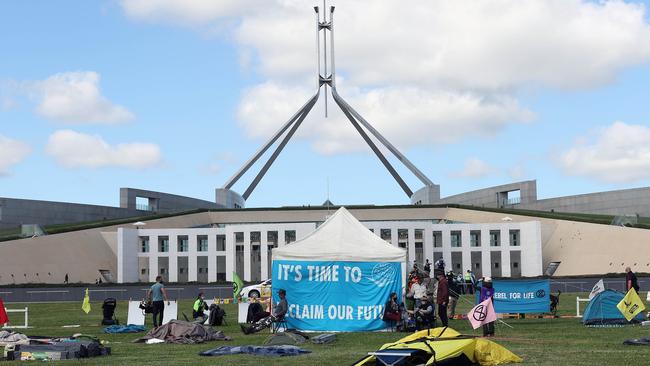
So warped are these sensibilities, so distant are the instincts of green-left journalists from any core values or beliefs, that they run entirely paradoxical arguments with a complete lack of awareness. Just a year after criticising Morrison over claims of a toxic parliamentary culture – pressure he reacted to by calling inquiries – they now slam him for suggesting Labor does the same.
Nine newspapers commentator Niki Savva this week smeared Kitching with claims of leaking to the Liberals and belittled the claims of her mistreatment while admonishing Morrison for even paying it any attention. “With so many other issues demanding his attention,” she wrote, “including sorting the cost-of-living package in the budget, flood reparations, additional help for Ukraine, uncompleted Liberal NSW preselections, not to mention the bullying accusations levelled against him, Morrison should have kept his distance.”
Or maybe, just maybe, Albanese should have stepped in to ensure a woman was not being mistreated. You know, toxic culture and all that. Or are we so far gone that a Labor problem now is the fault of a Liberal government?
This is the latest example exposing a broader crisis, where for the liberal left media, the facts are marshalled in favour of the political agenda. Just look to the US this month, where the Hunter Biden laptop story, derided, dismissed and censored 18 months ago when Joe Biden was on the cusp of election victory, has been revealed to be true and duly reported, factually, by The New York Times.
Likewise, Patricia Karvelas on Radio National interviewed Greens senator Lidia Thorpe this week and gormlessly accepted that a delay in a queue and a rejection of overweight hand luggage amounted to racist behaviour. How does the activist political mind become so divorced from reality – where every air traveller has experienced similar – that they amplify such confected outrage?
We have climate activists telling us our election will decide the fate of the planet and that federal government action can stop horrific fires and destructive floods. And we watch while the same people who feverishly promoted a fantasy that Vladimir Putin controlled the White House now report the sickening reality as Russia obliterates Ukraine.



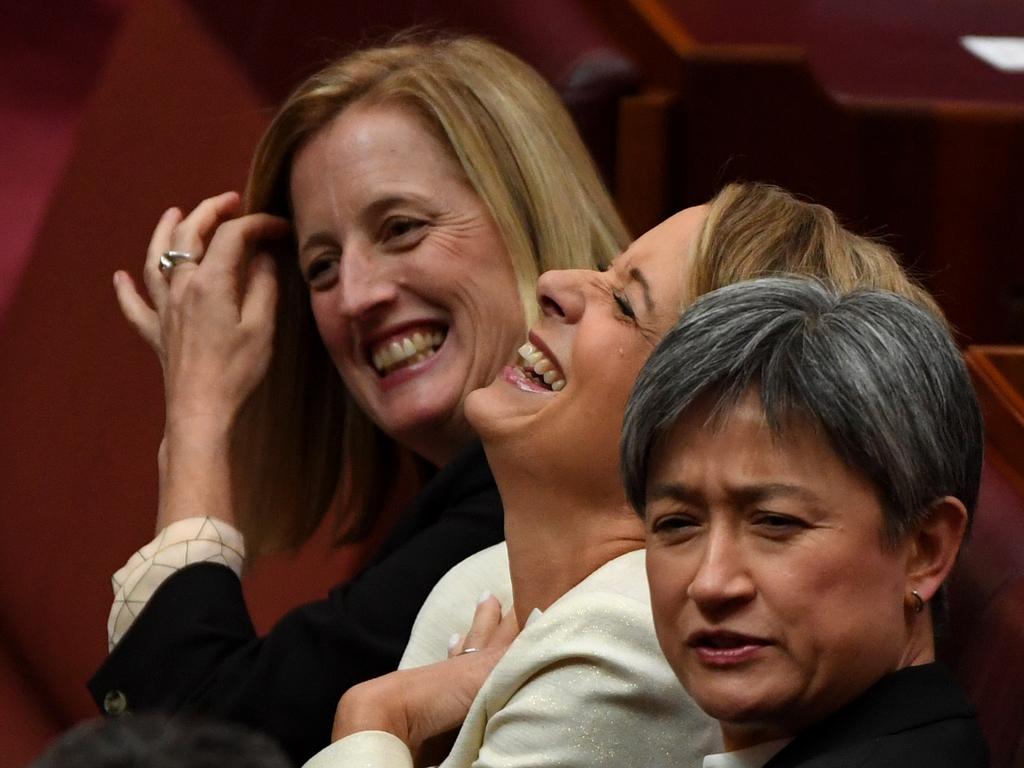
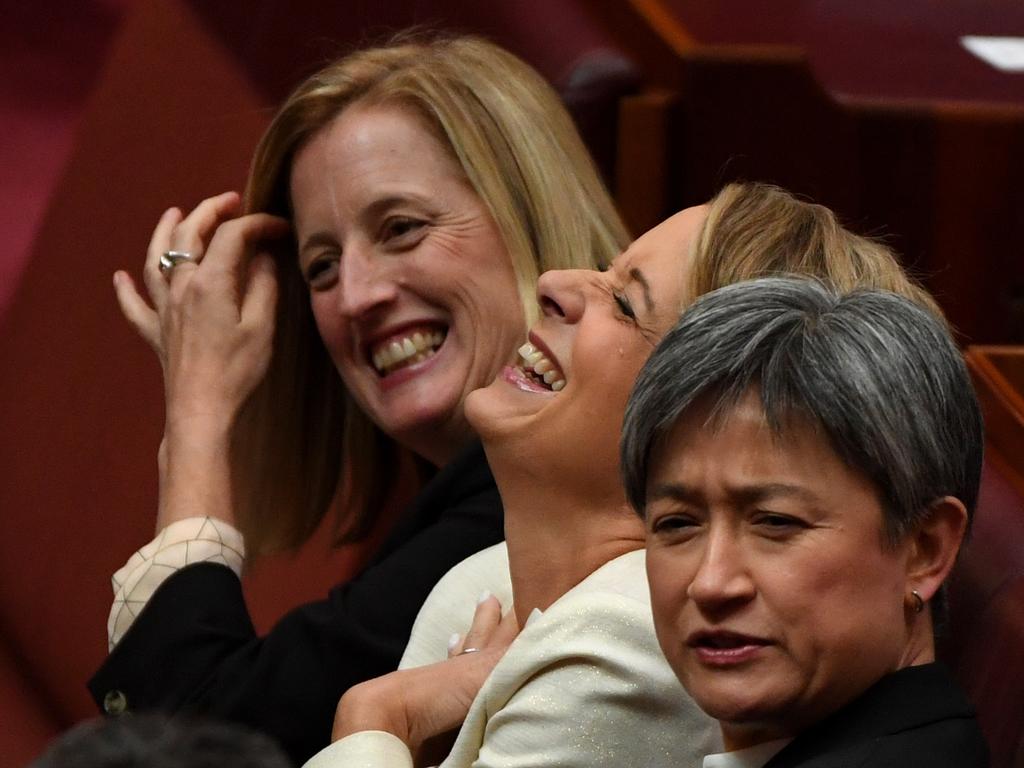


Hello darkness, my old friend. The sounds of silence from some, this past week, have been deafening, disturbing and depressingly predictable. At issue has been far more than politics – a woman’s life, safe workplaces, respect, and fairness. But hard, partisan politics have coloured all of it and too often have dictated the coverage, revealing a media preference for narrative over fact.